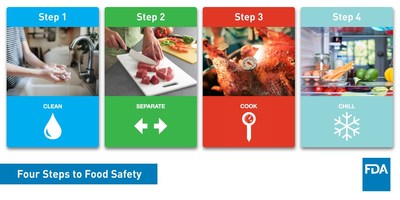SILVER SPRING, Md., Sept. 1, 2022 /PRNewswire-HISPANIC PR WIRE/ — September is National Food Safety Education Month. What better time to learn about how you can keep you and your family safe from foodborne illness, also known as “food poisoning”? Continue reading to learn about the four key steps for food safety: clean, separate, cook, and chill.

Clean
- Wash your hands with warm water and soap for at least 20 seconds before and after handling food.
- Rinse fresh fruits and vegetables under running tap water, including those with skins and rinds that are not eaten. Scrub firm produce with a clean produce brush.
- Wash your cutting boards, dishes, cooking tools, and countertops with hot soapy water after preparing each food item.
Separate
- Raw meat, poultry, eggs, seafood, and flour should not come in contact with foods that do not need to be cooked before eating. Keep them separate while shopping, storing, and cooking.
- Use a separate set of cooking tools for raw meat, poultry, eggs, seafood, and flour.
- Don’t reuse marinades used on raw foods unless you bring them to a boil first.
Cook
- Check the temperature with a food thermometer! Make sure food is cooked to a safe internal temperature before you eat it. Not sure what the correct temperature is? Here’s a quick reminder:
- Poultry should be cooked to 165° F.
- Ground meat, meat mixtures, and egg dishes should be cooked to 160° F.
- Beef, pork, veal, lamb, and uncooked ham should be cooked to 145° F and allowed to rest for 3 minutes.
- Fish and seafood should be cooked to 145° F.
- Leftovers and casseroles should be cooked to 165° F.
- Follow package directions on baking mixes and other flour containing products for correct cooking temperatures and specified times.
Chill
- Refrigerate or freeze meat, poultry, eggs, seafood, and other perishables within 2 hours of purchasing. Refrigerate within 1 hour if the temperature outside is above 90° F.
- Never thaw food at room temperature, such as on the countertop! There are three safe ways to defrost food: in the refrigerator, in cold water (change water every half hour to make sure it stays cold) and in the microwave. Food thawed in cold water or in the microwave should be cooked immediately.
- Divide large amounts of leftovers into shallow containers for quicker cooling in the refrigerator.
For more information, check out:
Contact: Media: 1-301-796-4540; Consumers: 1-888-SAFEFOOD (toll free)

Photo – https://mma.prnewswire.com/media/1876902/Food_Safety___US_Food_and_Drug_Administration.jpg
Logo – https://mma.prnewswire.com/media/585467/US_FDA_Logo.jpg
SOURCE U.S. Food and Drug Administration







